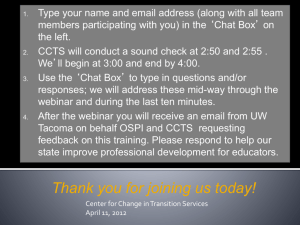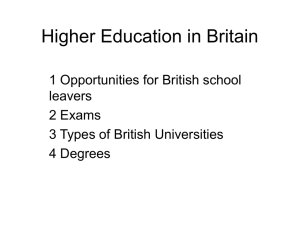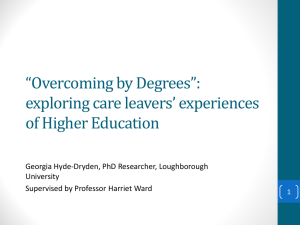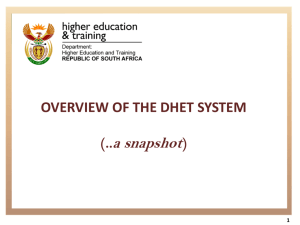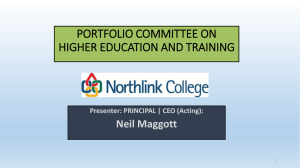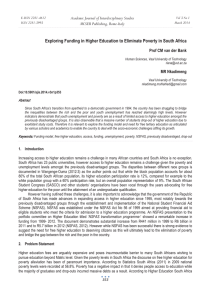Challenges of walk-ins in Higher Education Institutions
advertisement
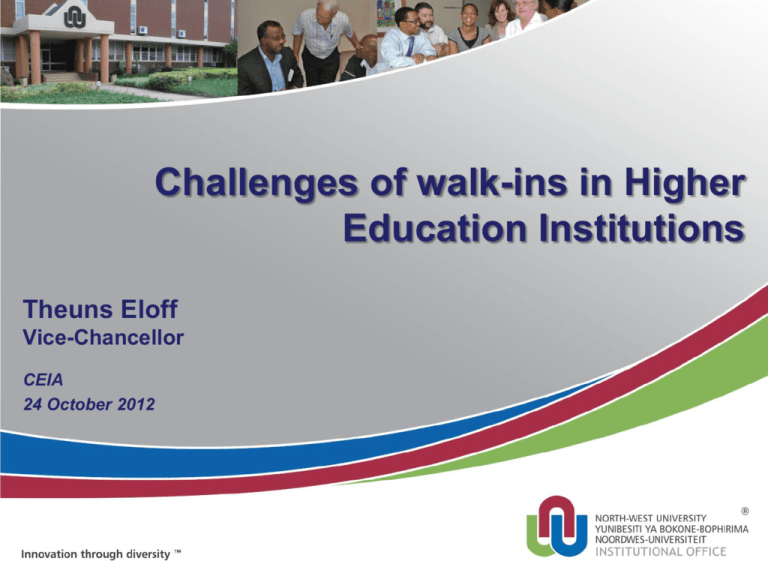
Challenges of walk-ins in Higher Education Institutions Theuns Eloff Vice-Chancellor CEIA 24 October 2012 CONTEXT: Why waiting for the last minute before registering? Socio-economic matters • 3 000 000 NEETs in SA (a reality check for the effectiveness and efficiency of all education & training in SA?) • More South Africans earn an income from welfare than from employment • Four out of ten South Africans are not employed; official statistics claim an unemployment rate of 24.7% • Achieving sustainable livelihoods across the board remains a challenge - poverty is a reality • More than 44% of workers in South Africa lives on less than R20 a day CONTEXT: Why waiting for the last minute before registering? Educational matters • SA’s expenditure on education is 6% of GDP (comparable to Germany and other highly developed countries). • SA’s education system is ranked 133/142 by World Economic Forum. • Teachers in some schools only teach an average of 3.5 hours per day. • 50% attrition rate from making it from grade 1 to grade 12 • Critical skills in literacy and numeracy keep on declining. No of school leavers with Mathematics keeps on declining • 80-90% of schools are ineffectively managed The dilemma of walk-ins… Expectations created by officials and politicians of unlimited access, no barriers as regards meeting prerequisites, free education … Poorly managed schools, fraught with union involvement providing sub-standard education. High levels of unemployment, financial insecurities of school leavers … The Minister’s cure for walk-ins in SA HE “Nzimande made the promise early this year following a stampede at the University of Johannesburg, where a mother was killed and 22 people injured while students were trying to enrol.” “Nzimande then promised the country that his department would discontinue walk-in registrations and centralise all applications by 2013.” Sowetan, 10 Aug 2012 How would such a Central Application System look like? Central Clearing House system to see to smooth running of application process An electronic information /database to channel applicants to places still available in HEITs, and informing institutions of possible applicants who meet entry requirements One single standardised application fee will be payable for all university applications. The same closing date for applications for all universities will apply. Once fully operational, the Central Application System would also provide for applications for financial aid and student housing through its channels. To be implemented from October 2012 for 2013 In addition to CAS, also DHET’s Apply now! Khetha campaign Launched in April 2012, the DHET, DBA, SAQA and NSFAS aim at providing (i) suitable career guidance to school leavers; (ii) information on minimum post-school entry requirements; (iii) how best to pursue their studies to get into chosen career paths (iv) information on post-school institutions that could be approached to pursue the studies Reality check no 1… Real good inititiatives, but the reality requests more … The state of higher education in South Africa • Capacity within DHET • Efficiency of NSFAS • More… Complexities in establishing a Central Application System • • • • • • Rushing in, only to retract later on because of unpracticabilities? Is there a political agenda? The sustainability of maintaining a central application system? Buy-in on a practical level from universities? Infringing on the autonomy of universities? More… Reality check no 2… Real good inititiatives, but the reality requests more … • We need to provide for 1.5 million university students in 18 years’ time • The country still only has 23 universities (not all functional) and two more in a planning phase, and approximately 50 FETs (not all functional) • This infrastructure is by far not enough to counter the current pressure on the system • For the short term, walk-ins will still be with us, or the system will lose them • Strange as it may sound, but many opportunities emerge from this pressing situation to open up access in more innovative ways, to ensure success with new technologies, to see to proper distance-learning offerings What are to be done now? Non-negotiables for a responsive and relevant HE sector: A common realisation that an ineffective school system would not be able to provide students who can cope in a post-school sector. An understanding that a central application system and central placement system (? Also on the cards?) is too simplistic an approach to try and solve many HE problems that manifest themselves in the walk-in matter At all institutions of higher learning: Good governance and professional management And more. Such as proper and efficient student support ; students taking up their responsibility of HE learning; an engaging employer community… In a nutshell A quality-driven, supportive and balanced TL Relevant & environment in which responsive PQM the student experience is NB IT ALL REVOLVES AROUND THE WAY IN WHICH A UNIVERSITY DOES ITS BUSINESS Seamless & integrated admission processes according to set milestones underpinned with good communication Professional and passionate recruitment team Dankie Thank you Ke-a-leboga

